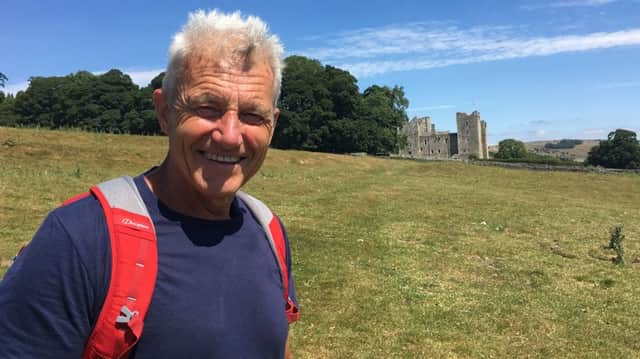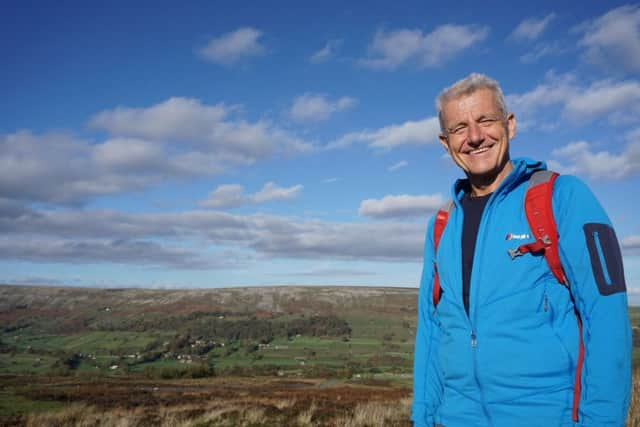The Yorkshire Dales with Paul Rose: Explorer’s warning over idyllic area’s public transport misery


Paul Rose is bubbling with enthusiasm as he discusses almost every facet of the experience of filming in the Yorkshire Dales and meeting many of those who call the National Park home. “I’m more in love with Yorkshire than I ever thought possible,” he says.
But there is one aspect of Dales life that he gives a less-than-glowing review to after spending last summer in the area making the three-part documentary series – the region’s struggling transport network. Rose, whose extraordinary career has seen him travel to some of the most remote and challenging regions of the world, says a lack of frequent and reliable bus and rail services in the area is having a knock-on effect of putting the road network under unsustainable pressure.
Advertisement
Hide AdAdvertisement
Hide Ad“You have got to work out the transport system,” he says. “It is not that large a part of Britain and you would think that it would be dead easy to get on a bus and go and enjoy somewhere. But it is almost impossible because the public transport system in Yorkshire is a complete disaster. They need to sort out the trains, it is inexcusable. On a nice day, every road is rammed.”


He says professional drivers, such as farmers and lorry drivers, share the road with tourists and day-trippers to frustrating effect for everyone – and that the Government needs to act.
“We have plenty of money in Britain, we can afford to do it. But the political will needs to be there.”
Rose’s concerns have considerable substance. In recent years, millions of pounds have been slashed from council budgets on subsidising rural bus services, while much of the Dales is unreachable by rail. Recent research by think-tank Centre for Towns warned that poor transport links across Yorkshire were holding the region back in securing jobs in the digital sector which are of continually-growing economic importance. Public spending on transport in Yorkshire and Humber fell by £18 per person in a year while increasing by £90 in London in 2017/18 - with Yorkshire and Humber suffering a bigger drop in spending than any other region in England.
Advertisement
Hide AdAdvertisement
Hide AdHowever, Rose’s documentary is very far from a lament about the challenges facing the Dales – instead profiling the communities and individuals taking on the challenges of the modern age and maintaining important traditions.
The three-part series, which has already been shown on regional television but will now reach a national audience on BBC Two from this Saturday, focuses on the people and places of Wensleydale, Swaledale and Wharfedale. From pioneering farmers to castle owners, the programme tells the stories of some of the 23,000 people who live in the Dales and sets out why its outstanding beauty makes it so popular with the near-five million visitors the area gets each year.
Rose says he hopes viewers will get to know a stunning part of the world better through his show. “I hope they feel the sense of celebration that I did. We were celebrating Yorkshire, its heart, history, the uplifting way the people are looking to the future and its opportunities and challenges,” he says. “I think it is a celebratory message and I hope it increases visitor numbers.”
One area of focus is the ‘Yorkshire grit’ on display in dealing with the impact of austerity and cutbacks. The first episode of the programme profiles the Little White Bus service which operates a fleet of buses driven by dozens of volunteers across much of the Dales. Having started in 2011 with an initial forecast of carrying 3,000 passengers a year, it now transports 20 times that number.
Advertisement
Hide AdAdvertisement
Hide AdRose also visited Hawes, where the local community has taken on the running the town’s library, Post Office and even a petrol station among other amenities, in addition to being involved with the Little White Bus service.
He says it was inspiring to see how people have rolled up their sleeves and made a determined effort to keep much-needed community services alive.
“When we were in Hawes and you see just how the austerity and cutbacks have affected this community and how they have said ‘right’, and taken this on. It felt like a classic Yorkshire attitude.
“They have got the only community-managed petrol station in the whole country, you have got to love that. It is a wonderful example to the rest of the country. This is what we need. If we are going to suffer cutbacks to council services and if we want communities to continue, we need these initiatives.”
Advertisement
Hide AdAdvertisement
Hide AdRose, who hails from Essex, is much more than just a television presenter. He is one of the world’s most experienced divers, field science and polar experts, a former president of the Royal Geographical Society and a previous base commander of Rothera Research Station in Antarctica; a job he did for the British Antarctic Survey for 10 years which resulted in him being awarded HM The Queen’s Polar Medal.
A mountain has been named after him in Antarctica, while on the other side of the world on a Greenland expedition in 2012 he led the first expedition to successfully traverse a new 275km icecap route of Knud Rasmussen Land and repeated his first ascent of the north face of Gunnsbjørnfjeld, the highest mountain in the Arctic.
His enthusiasm for life shines through in his new show and in the first episode alone, Rose also packs in visits to Aysgarth Falls and Bolton Castle, as well as joining Yorkshire cyclist Annie Simpson for a challenging ride up one of the highest points in the Dales, the renowned Buttertubs Pass. He also meets the first female guard on the Wensleydale railway, as well as spending time with local farmer Rodney Beresford who works with the Yorkshire Dales Millennium Trust to allow refugees from conflict-torn countries who have moved to northern England to learn the basics of sheep-farming.
Rose, who lives in the Lake District and whose previous programmes include exploring the Yorkshire Wolds Way walking trail, says filming in the Dales was a truly inspiring experience.
Advertisement
Hide AdAdvertisement
Hide Ad“There are not many places to rival the stunning landscapes of the Yorkshire Dales. I loved pulling on my boots again and exploring its world class sights and meeting the hard working people who make their living in this amazing landscape.
“I have always loved Yorkshire but I have mainly known it as a caver, climber and cyclist. I am one of the many people who have rediscovered Yorkshire through cycling. Meeting all the great contributors has had a massive impact to the point where I am genuinely in love with Yorkshire. I have always had an affinity with it but now I really, really love Yorkshire.
“I have been back a lot more since the series. I was even going back for breaks in Yorkshire while we were filming which is a first for me. Some of the places were so beautiful.”
Credit to research team
Paul Rose credits director and producer Paul Greenan and his “tiny team” at BBC Yorkshire for finding the fascinating participants living in the Yorkshire Dales for the programme.
Advertisement
Hide AdAdvertisement
Hide AdHe says extensive research went into finding people with interesting stories to feature in the show.
“Paul Greenan and a couple of others put in a vast amount of legwork,” he says.
Rose says he particularly enjoyed a visit to one farm in Swaledale where he met farmers responsible for looking after rare wild flower habitats. “It was lovely to see the passion and the love they put into it to make sure everything was right,” he says. “It was really something.”
The Yorkshire Dales with Paul Rose will start on Saturday, May 18, at 7pm on BBC Two.